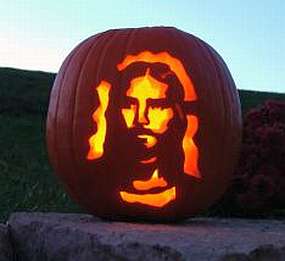 Okay, so color me one of those people who doesn’t get the Halloween Alternative Party that churches throw.
Okay, so color me one of those people who doesn’t get the Halloween Alternative Party that churches throw.
Some call it a Harvest Party/Festival, which is particularly amusing when it happens in churches in the cities or suburbs, both of which are famous for their agricultural base, right? Such references to fecundity also leave me scratching my head. How many see the connections with Christian “harvest festivals” and the various pagan festivals that also celebrate the fertility of the harvest? I mean, if we’re working that hard to distance ourselves from Halloween, enough to throw a distinct celebration, why are we linking ourselves to another pagan festival?
I’m not a fan of Halloween. That it has become big business and an opportunity for adults to wear risqué clothing only makes it worse. I mean, when I was a kid, Halloween was about as scary and wicked as Charlie Brown getting nothing but rocks during his trick or treating.
I’ll admit, though, that Halloween is more focused on shock value than it once was, and that kids are more likely to dress up as zombies with their livers hanging out than fairy princesses or “sheet ghosts,” so the trend IS downward. (Though I also will add that a downward trend marks most everything in our culture, even in the Church.)
If you’re in a particular denomination that fancies itself highly attuned to the spiritual world, you’ll likely hear church leaders offer reasons why your denomination/church eschews any association at all with “the devil’s antics” on Halloween. You’ll hear the obligatory history of Halloween. You’ll have the associations clearly drawn for you. You’ll drink the Kool-Aid. And you’ll feel the compulsion to ensure your kids avoid the pathway to hell that is Halloween.
And thus is born the Halloween Alternative Party. Like everything in modern American Christianity, the idea that we Christians might be left out of secular “fun” just doesn’t sit well with us. No one wants to be a party pooper, while at the same time that burning American Christian need to Christianize secular activities compels us.
The only problem, as I see it, is that the Halloween Alternative Party still looks and feels a lot like Halloween.
| Halloween | Halloween Alternative | |
| A fun time with others | Yes | Yes |
| Candy | Yes | Yes |
| Tainted Candy | No | No |
| Other treats | Yes | Yes |
| Elements of the harvest (pumpkins, etc.) | Commonly | Commonly |
| Other themed decorations | Commonly | Commonly |
| Scary/evil elements | Commonly, but varies widely | Less commonly, unless the church sponsors an evangelistic “Hell House,” and then all bets are off |
| The majority of participants purposefully celebrating the demonic | Unlikely | No |
| Kids in costumes | Yes | Yes |
| Adults in costumes | Commonly | Commonly |
| “Noticeable” teen or adult females wearing costumes highly noticed by teen and adult males | Unlikely outside of adult parties | Oh, the stories… |
So yes, I’m baffled. If there’s a genuine distinction between the two, I’m missing it. If it comes down to one being a slightly less scary version of the other, is that enough to distance ourselves from what are being sold as the genuine dangers of Halloween itself?
The comments are open. Please set me straight.
